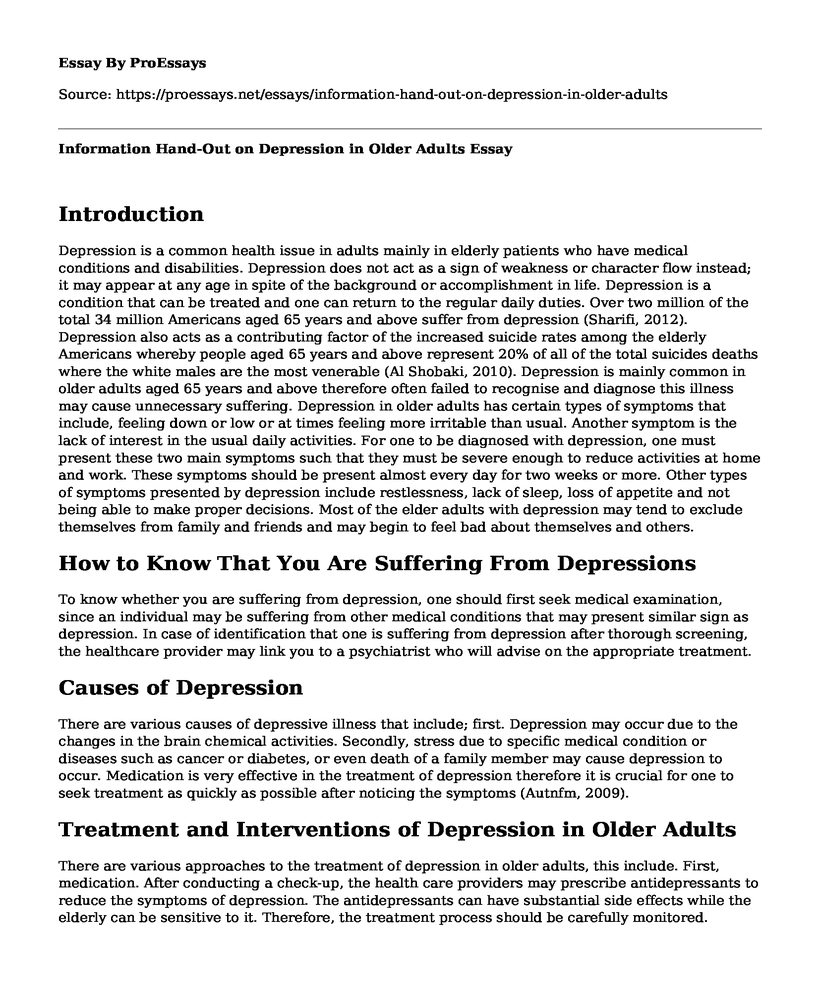Introduction
Depression is a common health issue in adults mainly in elderly patients who have medical conditions and disabilities. Depression does not act as a sign of weakness or character flow instead; it may appear at any age in spite of the background or accomplishment in life. Depression is a condition that can be treated and one can return to the regular daily duties. Over two million of the total 34 million Americans aged 65 years and above suffer from depression (Sharifi, 2012). Depression also acts as a contributing factor of the increased suicide rates among the elderly Americans whereby people aged 65 years and above represent 20% of all of the total suicides deaths where the white males are the most venerable (Al Shobaki, 2010). Depression is mainly common in older adults aged 65 years and above therefore often failed to recognise and diagnose this illness may cause unnecessary suffering. Depression in older adults has certain types of symptoms that include, feeling down or low or at times feeling more irritable than usual. Another symptom is the lack of interest in the usual daily activities. For one to be diagnosed with depression, one must present these two main symptoms such that they must be severe enough to reduce activities at home and work. These symptoms should be present almost every day for two weeks or more. Other types of symptoms presented by depression include restlessness, lack of sleep, loss of appetite and not being able to make proper decisions. Most of the elder adults with depression may tend to exclude themselves from family and friends and may begin to feel bad about themselves and others.
How to Know That You Are Suffering From Depressions
To know whether you are suffering from depression, one should first seek medical examination, since an individual may be suffering from other medical conditions that may present similar sign as depression. In case of identification that one is suffering from depression after thorough screening, the healthcare provider may link you to a psychiatrist who will advise on the appropriate treatment.
Causes of Depression
There are various causes of depressive illness that include; first. Depression may occur due to the changes in the brain chemical activities. Secondly, stress due to specific medical condition or diseases such as cancer or diabetes, or even death of a family member may cause depression to occur. Medication is very effective in the treatment of depression therefore it is crucial for one to seek treatment as quickly as possible after noticing the symptoms (Autnfm, 2009).
Treatment and Interventions of Depression in Older Adults
There are various approaches to the treatment of depression in older adults, this include. First, medication. After conducting a check-up, the health care providers may prescribe antidepressants to reduce the symptoms of depression. The antidepressants can have substantial side effects while the elderly can be sensitive to it. Therefore, the treatment process should be carefully monitored.
Secondly, lifestyle changes, this includes daily physical exercises, good eating habits, and increasing moral support are essential in assisting the elderly suffering from depression. Family and friends may help through conducting weekly visits and conducting scheduled group outings.
Thirdly, psychotherapy talk therapy can also assist in support of the elderly patients with depression. Short-Term focused treatment like cognitive behaviour therapy may help in reducing the behaviour and thought the pattern that leads to the depressive symptoms this type of therapy is beneficial for those who chose not to take medications and have only moderate symptoms (Luciana, 2010).
Fourth, support groups, this is the group created to link the older adults going through the same issue of depression. The support groups are essential in providing a safe space to talk and provide social support through sharing what they usually go through and even advice each other on how to handle the situations.
References
Al Shobaki, N. H., & Samawi, F. S.(2010) The Effectiveness of a Group Training Program in Reducing Depression And Improving Adjustment of the Elderlies in Amman City.
Autnfm, R. (2009). Depression: America's declining depression. Journal of mental health, 6(3), 65-78.
Luciana, R. P. (2010). The teacher's depression case study. Procedia-Social and Behavioral Sciences, 2(2), 4972-4976.
Sharifi, M., & Fatehizade, M. (2012). Correlation between religious coping with depression and caregiver burnout in family caregivers. Modern Care Journal, 9(4), 327-335.
Cite this page
Information Hand-Out on Depression in Older Adults. (2022, May 22). Retrieved from https://proessays.net/essays/information-hand-out-on-depression-in-older-adults
If you are the original author of this essay and no longer wish to have it published on the ProEssays website, please click below to request its removal:
- A General Overview of the Importance of Fire and Life Safety Education
- Paper Example on Deviance Behavior of Lee Malvo and John Muhammad
- Paper Example on Psychological Capital and Substance Abuse: A Study on Mental Health
- My Leadership Strengths and Areas for Growth: A Reflective Essay
- Essay on College Students: Addressing Body Image Struggles and Its Effects
- Depression: Poor, Ethnic Minorities Less Likely to Receive Treatment - Essay Sample
- Essay Sample on Coping with Anxiety: A Key to Overcoming Stress







